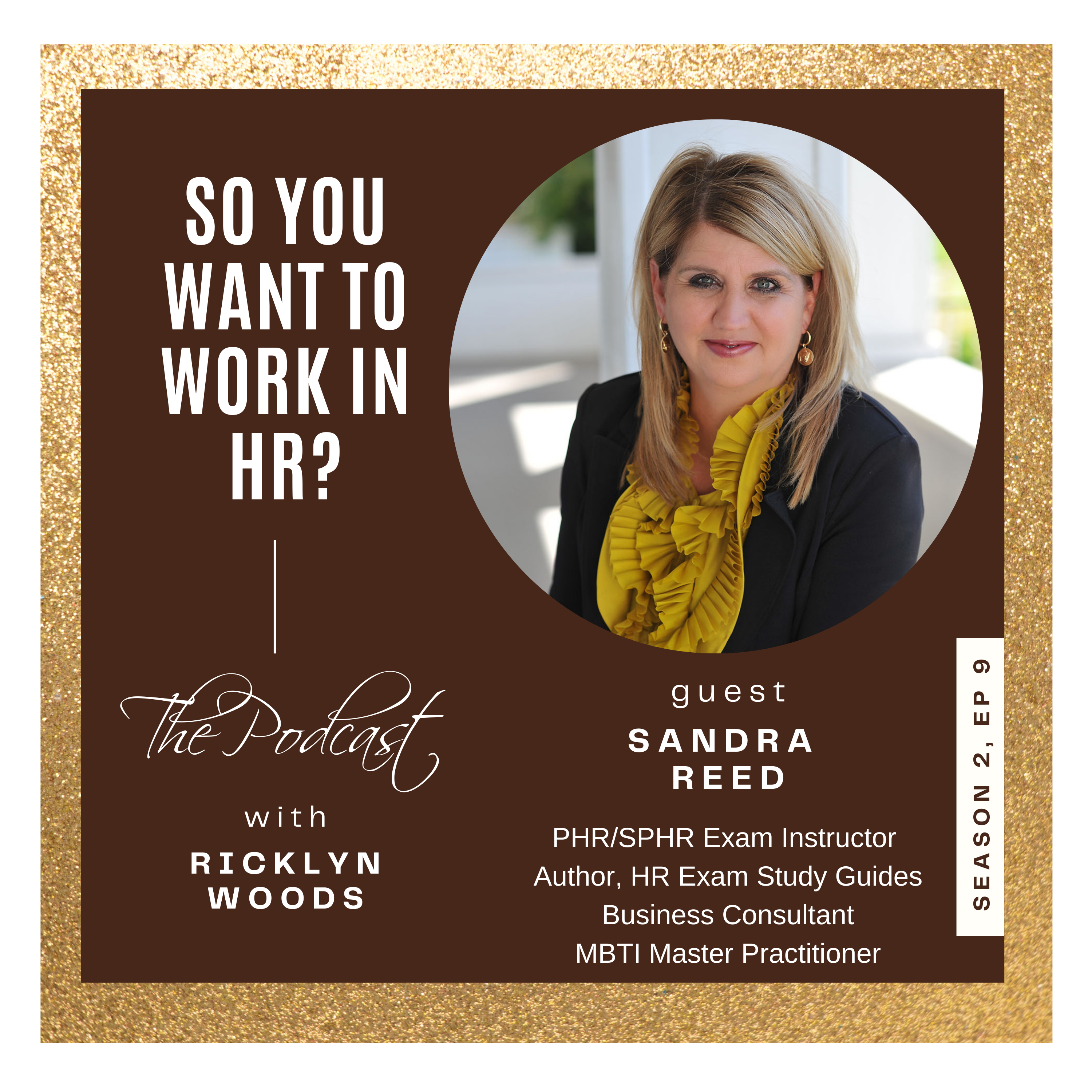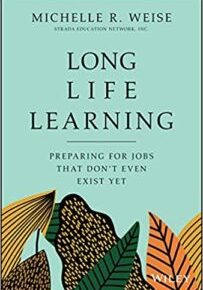For this episode of the podcast, I was joined by a very special guest, Sandra M. Reed, SPHR. Reed will encourage all of us to give ourselves permission to dream bigger.
That name may sound familiar to quite a few of you. Reed is a leading expert in the certification of HR professionals. She published HRCI’s Official Guide to the Human Resource Body of Knowledge and numerous PHR/SPHR exam preparation books.
Additionally, she is the author of SHRM case studies, learning modules and training for adult students.
Reed holds her undergraduate degree in Industrial-Organizational psychology and her graduate degree in Organizational Leadership, and is a Master Practitioner of the Myers-Briggs Type Indicator personality assessment - also known as MBTI - and the owner of a business consulting group that specializes in strategy, organizational effectiveness and design and leadership development for small businesses.
In this episode, you will learn:
- The Empowerment of HR Certifications
- How to Dream Bigger Before You're Ready
- What HR Certifications Should You Pursue
Also, learn Sandra Reed's pick for HR professionals's book of the decade.

Empowerment in Certification
Interesting fact about Sandra Reed: it took her 30 years to finish her degrees. You wouldn't know it though due to her successful career. She grew up in a family who didn't understand the value of education. Her great family simply prioritized it differently than she did. With raw talent, an unmet desire to attend school, and unsure what to do next, Reed started where she could. She started staffing as a receptionist.
While staffing, Reed began to unconsciously gravitate towards the work she enjoyed and felt she did well. Here HR certifications played a major role.
You don't have to have a degree in order to get certified in HR and empowered me to set a goal for me to say, 'Okay, I might not be able to finish my degree right now or in four years, but I can do things professionally that will help me move a very specific career forward in HR.
It's one of the reasons I love HR so much.
Additionally, education remained important to Reed. Determined to not let her degree go unfinished, 30 years later, she finished her graduate degree.
Your Human Resources career following your major
I also do career advising for University of Phoenix. A common concern I hear from a student is, "I don't even have a job in my major." Sometimes this frustration comes from the idea that their major is what they believe they're supposed to do. Thus, they feel like a failure, because their major says this, but they are interested in something else or are doing something else.
I help them to reframe their thinking and get them to really give themselves permission to not do something within their major and know it's okay. I even help them to see how their skills and education are being utilized in their current work.
So yes, education is important. However, let's not get lost in trying to define things so rigidly. Instead, give yourself permission to dream bigger.
Dream Bigger Before You're Ready
One of Reed's themes in life is "standing on the shoulder of giants."
In Sheryl Sandberg's book Lean In, she shows women tend to not apply for a job unless they are extremely qualified. Reed experienced this herself. Imposter syndrome, the idea that one is not good enough, is real. It creates doubt for many women. It drives women to assume we are competing without a full tool belt. These thoughts are self imposed. These thoughts turn into limiting beliefs. And what do they result in?
We dream too small
Reed admits she dreamed too small. While we all want success, we feel insufficient. Young women especially have a burning voice. They feel it. They can hear it in their heads. Yet, they lack the place to channel it.
To individuals who struggle with that, here's what Reed would advise. Close your eyes, take maybe one toe first, then the whole thing.
One thing I often ask my clients that I work with in the coaching space is where do they see themselves or what job do they envision themselves in?
I find myself often giving them a caveat of there is no wrong answer. This is a safe space for you to say whatever. Say whatever comes to your heart, to your mind. Giving people permission to dream bigger is important.
Reed says it best herself,
Most of my career has been defined by me doing things I should have never done - I should have never said yes to. Because if I waited to be completely qualified I would have never gone for it.
Are you trusting your preparation? Or, are you trusting your talent? When you stop trusting your preparation and go for it, then your authenticity shines!
So, just go for it!
HR Certifications to Pursue
I get a ton of questions from people in HR. Some common questions are,
- What certification should I get?
- Which exam is better than the other?
- Which certification is more valued by employers?
Depending on who you ask, you'll get a different set of answers. So, I asked Reed.
Which Human Resources certification should I get?
The answer that I always give to that question is that there have always been options for Human Resources certificates. So you know HRCI with the PHR. Then the SPHR and their PHR. They definitely have an important body of exams. High standards couldn't say enough about those exams.
However, even before the split between SHRM and HRCI, HR professionals had choices, whether it was a compensation specialist or safety specialist or training specialist.
Having a choice is not anything that's new. The book that I'm currently writing is for the SHRM exams. The body that I have published just for the PHR and the SPHR exams. What's coming up is a study guide for the SHRM exams: the CP and the SCP.
As I'm looking at the SHRM exam body of competency and knowledge, and comparing that with the HRCI exam body of knowledge, the fundamentals are there. The leadership theories, theories of motivation, total rewards strategies, and how to re-skill, up skill, and hire: those are all themes that are in both exams.
What would you say to someone who isn't sure which exam to take?
I would encourage anybody who's not quite sure, first of all there's nothing wrong with getting both. I think that because if you're going to invest in the studying for one, it's not too far of a reach to sit for the next one fairly soon after. So maximize, optimize, that time you spent preparing.
The other thing that I say when I get those types of questions is contrary to popular belief, the end goal is not the credential.
The true value is the preparation process.
I say that because even if you pass or fail one, take it again, you're going to pass, it happens to a lot of people. If you're really not confident, take it again you're going to get there.
But the process of preparing you become a more effective HR leader. Simply because you're engaging in the exact same behaviors that you have to have to be good at your job: discipline, resilience, knowledge growth, asking questions, being curious, and showing up for yourself. All of these things are going to help you be a better HR professional and you're gaining knowledge about your industry.
So even if you don't pass, you're better at the end than you were when you started. That is incredibly empowering. Even more so than being able to put the initials at the end of your name on LinkedIn.
It's a win-win! It helps you to dream big!
I'm so glad she said that, because I totally agree with her thought process. When people message me, I hear "If I get this certification, will it help me get a job, or get a better job, in HR?" So, I typically kind of put it back on them to really understand their motivation for getting certified. If it is just to the end goal is to get X job then you might wind up disappointed because there are no guarantees. But if you do it as part of your professional development, then you win either way!
LISTEN TO THIS EPISODE NOW!
Listen & follow on your favorite platform: Apple Podcasts | Spotify | Google Podcasts | Audible
So, what's Reed's pick for the book of the decade for HR professionals?
Long Life Learning by Michelle Weiss
